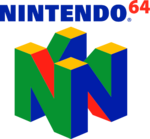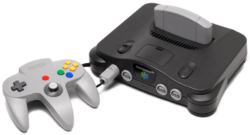| Site Notice |
|---|
|
We have a limited coverage policy. Please check our coverage page to see which articles are allowed. |
Difference between revisions of "Nintendo 64"
m |
m (Text replacement - "Zeldapedia" to "Zelda Wiki") |
||
| (4 intermediate revisions by 4 users not shown) | |||
| Line 40: | Line 40: | ||
The Nintendo 64 was very popular for many reasons, one of the big ones being the release of ''[[Super Mario 64]]''. ''Super Mario 64'' was one of the first games of its kind to feature full 3D graphics and depth of field effects. The Nintendo 64 was able to pull this off because it was the first system to feature a 64-Bit processor and 32-bit graphics chip (aside from the failed Atari Jaguar, which was really 32-bit) The Nintendo 64 also featured the first successful analog control sticks, and four built-in controller ports. The Nintendo 64 was also noted as the last home console system to use cartridges, before Nintendo started using discs like its competitors. | The Nintendo 64 was very popular for many reasons, one of the big ones being the release of ''[[Super Mario 64]]''. ''Super Mario 64'' was one of the first games of its kind to feature full 3D graphics and depth of field effects. The Nintendo 64 was able to pull this off because it was the first system to feature a 64-Bit processor and 32-bit graphics chip (aside from the failed Atari Jaguar, which was really 32-bit) The Nintendo 64 also featured the first successful analog control sticks, and four built-in controller ports. The Nintendo 64 was also noted as the last home console system to use cartridges, before Nintendo started using discs like its competitors. | ||
| − | The Nintendo 64 hosted a wide variety of games, but most of its hits were first-party titles such as ''Super Mario 64'', | + | The Nintendo 64 hosted a wide variety of games, but most of its hits were first-party titles such as ''Super Mario 64'', {{ga|Super Smash Bros.}}, ''[[Mario Kart 64]]'', ''[[Mario Party]]'', ''[[Star Fox 64]]'', {{zel|Ocarina of Time}} and ''[[F-Zero X]]''. [[Rareware]], however, developed quite a few hits for the N64, such as ''[[GoldenEye 007]]'', ''[[Banjo-Kazooie]]'' and ''[[Donkey Kong 64]]''. Production ended in 2002, the last game released for it being ''[[Tony Hawk's Pro Skater 3]]''. |
==System specs== | ==System specs== | ||
| Line 103: | Line 103: | ||
*[[Nintendo 64 RF Modulator]] | *[[Nintendo 64 RF Modulator]] | ||
| − | == | + | ==See also== |
| − | |||
| − | |||
| − | |||
*[[Nintendo 64 Controller]] | *[[Nintendo 64 Controller]] | ||
*[[iQue Player]] | *[[iQue Player]] | ||
| + | |||
| + | ==External links== | ||
| + | *{{wp|Nintendo 64|Nintendo 64 on Wikipedia}} | ||
| + | *{{sw|Category:Nintendo 64|Nintendo 64 on StrategyWiki}} | ||
| + | *{{bp|Nintendo 64|Nintendo 64 on Bulbapedia}} | ||
| + | *{{smw|Nintendo 64|Nintendo 64 on Super Mario Wiki}} | ||
| + | *{{zw|Nintendo 64|Nintendo 64 on Zelda Wiki}} | ||
| + | *{{fzw|Nintendo 64|Nintendo 64 on F-Zero Wiki}} | ||
| + | *{{lw|Nintendo 64|Nintendo 64 on Lylat Wiki}} | ||
| + | *{{met|Nintendo 64|Nintendo 64 on Metroid Wiki}} | ||
| + | *{{np|Nintendo 64|Nintendo 64 on Nookipedia}} | ||
| + | *{{ssb|Nintendo 64|Nintendo 64 on SmashWiki}} | ||
| + | *{{wb|Nintendo 64|Nintendo 64 on Wikibound}} | ||
| + | *{{wk|Nintendo 64|Nintendo 64 on WiKirby}} | ||
| + | |||
{{stub}} | {{stub}} | ||
Latest revision as of 01:46, 18 January 2023
| Nintendo 64 ニンテンドー64 Nintendō Rokujūyon, NINTENDO64 | ||||||||||
| ||||||||||
| ||||||||||
| ||||||||||
| ||||||||||
| ||||||||||
|
The Nintendo 64 (ニンテンドー64, Nintendō Rokujūyon, NINTENDO64) was a video game console created by Nintendo. It was released in 1996 to compete with the Sega Saturn and PlayStation.
The Nintendo 64 was very popular for many reasons, one of the big ones being the release of Super Mario 64. Super Mario 64 was one of the first games of its kind to feature full 3D graphics and depth of field effects. The Nintendo 64 was able to pull this off because it was the first system to feature a 64-Bit processor and 32-bit graphics chip (aside from the failed Atari Jaguar, which was really 32-bit) The Nintendo 64 also featured the first successful analog control sticks, and four built-in controller ports. The Nintendo 64 was also noted as the last home console system to use cartridges, before Nintendo started using discs like its competitors.
The Nintendo 64 hosted a wide variety of games, but most of its hits were first-party titles such as Super Mario 64, Super Smash Bros., Mario Kart 64, Mario Party, Star Fox 64, The Legend of Zelda: Ocarina of Time and F-Zero X. Rareware, however, developed quite a few hits for the N64, such as GoldenEye 007, Banjo-Kazooie and Donkey Kong 64. Production ended in 2002, the last game released for it being Tony Hawk's Pro Skater 3.
System specs
Processors:
- CPU: MIPS 64 bit Risc CPU, (R4300I series) 93.75 MHz
- Graphics 64-bit MIPS Risc Co-processor, GSP & DP, 62.5 MHz (RCP)
- Built-in Audio/Video Vector Processor (RSP)
- Built-in Pixel Drawing Processor (RDP)
Transmission Speed:
- Maximum of 4 500 Mbit/second
Memory:
- 4.5 MB Rambus DRAM (36 megabits)
- Rambus DRAM subsystem
- Custom 9-bit Rambus Bus (to the DRAM)
Video:
- Resoloutions: 256x224 to 640x480. PAL also 768x576
- Video Output: RF, Stereo A/V, S-Video
- Color:21-bit color video output, 32-bit RGPA, pixel colour frame
buffer support
Audio:
- Digital Sound
- Wavetable Synthesis
Major Special Features:
- Perspective correct texture-mapping
- Realtime Anti-Aliasing
- Tri-Linear Mip-Mapping
- Z-Buffering
- Flicker-free interlaced mode support
Expansion Options:
- Cartridge Slot
- Controller Ports
- Pak Holder (Controller)
- Extension port (Bottom)
- Memory Expansion Option (Top Front)
Dimensions:
- Width 260mm (10.23") x Depth 190mm (7.48") x Height 73mm (2.87")
- Weight 2.42 lbs (1.1kg)
Games
| See also: Category:Nintendo 64 games |
Accessories
- Nintendo 64 Controller
- Controller Pak
- Jumper Pak
- Expansion Pak
- Rumble Pak
- Transfer Pak
- Wide-Boy 64
- Nintendo 64DD
- Voice Recognition Unit (VRU)
- Nintendo 64 Dance Pad
- Nintendo 64 Cleaning Kit
- Nintendo 64 RF Switch
- Nintendo 64 RF Modulator
See also
External links
- Nintendo 64 on Wikipedia
- Nintendo 64 on StrategyWiki
- Nintendo 64 on Bulbapedia
- Nintendo 64 on Super Mario Wiki
- Nintendo 64 on Zelda Wiki
- Nintendo 64 on F-Zero Wiki
- Nintendo 64 on Lylat Wiki
- Nintendo 64 on Metroid Wiki
- Nintendo 64 on Nookipedia
- Nintendo 64 on SmashWiki
- Nintendo 64 on Wikibound
- Nintendo 64 on WiKirby
| This article is a stub. You can help NintendoWiki by expanding it. |
|
|
| |||||||||||||||||||||
| |||||||||||||||||||||
| |||||||||||||||||||||




